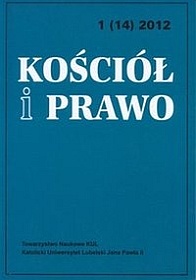Rola Papieskiej Rady ds. Interpretacji Tekstów Prawnych w stosowaniu prawa kanonicznego
Abstrakt
Ecclesiastical law interpretation has significant meaning in law application. The most important function of the Pontifical Council for Legislative Texts is an authentic interpretation.
The Author explains what the interpretation and authentic interpretation is. According to the can. 16 § 1, the legislator authentically interprets laws as does the one to whom the same legislator has entrusted this power. The Pontifical Council for Legislative Texts is competent to public authentic interpretations confirmed by the pontifical authority.
Activity of the Pontifical Council for Legislative Texts means how dynamic canon law is. On the other side, this Pontifical Council activity is indispensable due to the technological progression.
Activity of the Pontifical Council for Legislative Texts means how dynamic canon law is. On the other side, this Pontifical Council activity is indispensable due to the technological progression.
Bibliografia
Dudziak, Jan. 2002. Prawo kanoniczne. 1. Normy ogólne. Tarnów: Wydawnictwo Diecezji Tarnowskiej BIBLOS.
Dzierżon, Ginter. 2007. „Interpretacja autentyczna ustaw kościelnych.” Seminare 24:191-204. http://www.seminare.pl/?slowo=interpretacja [dokument w formie pdf] [dostęp: 23.04.2012].
Gerosa, Libero. 1999. Prawo Kościoła. Poznań: Pallottinum.
Hill, Richard A. 1982. “Reflections on the Interpretation of the Revised Code.” The Jurist 42, no. 2:311-319.
Huels, John M. 2000. “Canon 16 – authentic interpretation.” In New Commentary on the Code of Canon Law, eds. John P. Beal, James A. Coriden, and Thomas J. Green, 70-73. New York–Mahwah: Paulist Press.
Lewandowski, Jerzy. 1999. Elementy prawa. Warszawa: Wydawnictwa Szkolne i Pedagogiczne.
Miragoli, Egidio. 1989. “L‘interpretazione autentica delle leggi ecclesiali. I primi cinque anni di attività della Pontificia Commissione.” Quaderni di Diritto Ecclesiale 2, no. 2:211-222.
Otaduy, Javier. 1995. “Los medios interpretativos de la ley canónica (y su relación con las distintas doctrinas de la interpretation).” Ius canonicum 70:447-500.
Otaduy, Javier. 2002. “Comentario al can. 16.” In Comentario exegético al Código de Derecho Canónico, vol. 1, eds. Ángel Marzoa, Jorge Miras, and Rafael Rodríguez-Ocaña, Tercera edición actualizada, 351-358. Pamplona: Ediciones Universidad de Navarra, S.A.
Pawluk, Tadeusz. 2002a. Prawo kanoniczne według Kodeksu Jana Pawła II. T. 1, Zagadnienia wstępne: normy ogólne. Olsztyn: Warmińskie Wydawnictwo Diecezjalne.
Pawluk, Tadeusz. 2002b. Prawo kanoniczne według Kodeksu Jana Pawła II. T. 2, Lud Boży, jego nauczanie i uświęcanie. Olsztyn: Warmińskie Wydawnictwo Diecezjalne.
Polvani, Carlo Maria. 1999. Authentic interpretation in canon law. Reflections on a distinctively canonical institution. Roma: Gregorian & Biblical Press.
Rozkrut, Tomasz. 2009. „Papieska Rada ds. Tekstów Prawnych. Interpretacja autentyczna kanonów Kodeksu z 1983 roku.” Prawo Kanoniczne 52, nr 1-2:115-137.
Sitarz, Mirosław. 2004. Słownik prawa kanonicznego. Warszawa: Instytut Wydawniczy Pax.
Sobański, Remigiusz. 1987. „Uwagi o interpretacji prawa kościelnego.” Prawo Kanoniczne 30, nr 1-2:31-45.
Sobański, Remigiusz. 2003. „Komentarz do kan. 16.” W Józef Krukowski, Remigiusz Sobański, Komentarz do Kodeksu Prawa Kanonicznego. T. I: Księga I. Normy ogólne, red. Józef Krukowski, 67-69. Poznań: Pallottinum.
Stankiewicz, Antoni. 1979. „Interpretazione della legge con riferimento alle funzioni della potestà ecclesiastica.” Apollinaris 52, fasc. 3-4:416-441.
Stawecki, Tomasz, i Piotr Winczorek. 1999. Wstęp do prawoznawstwa. Warszawa: Wydawnictwo C. H. Beck.
Copyright (c) 2012 Kościół i Prawo

Utwór dostępny jest na licencji Creative Commons Uznanie autorstwa – Użycie niekomercyjne – Bez utworów zależnych 4.0 Międzynarodowe.





